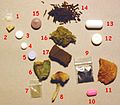Psychoactive drug
Psychoactive drugs, also known as psychotropic drugs, are substances that can alter the consciousness, mood, and perceptions of those who take them. They are used in the management of mental and emotional disorders, to enhance particular mental activities, in religious or spiritual rituals, or for recreational purposes. These substances interact with the central nervous system, particularly the brain where they can change brain function, resulting in temporary changes in perception, mood, consciousness and behavior<ref>Julien, Robert,
A Primer of Drug Action, Macmillan, 2011,</ref>.
Classes of Psychoactive Drugs[edit]
Psychoactive drugs can be classified into several categories based on their pharmacological effects:
- Stimulants: These substances increase the activity of the central nervous system. Examples include caffeine, nicotine, amphetamines, and cocaine.
- Depressants: They decrease the central nervous system activity. Examples are alcohol, benzodiazepines, and barbiturates.
- Opioids: These substances produce a sense of euphoria and are used for pain relief. Examples include morphine, codeine, and heroin.
- Hallucinogens: Hallucinogens alter perceptions, thoughts, and feelings. They include LSD, psilocybin, and mescaline.
- Cannabinoids: They alter perception and mood, examples include THC (found in marijuana) and CBD.
Risks and Regulation[edit]
Psychoactive drugs can lead to psychological and physical addiction or dependence, and their use can have serious health consequences, including death. In many parts of the world, their production, sale, and use are regulated or banned by law<ref>Schuckit, Marc,
Recognition and management of withdrawal delirium (delirium tremens), New England Journal of Medicine, 2016, Vol. 371, pp. 2109–2113,</ref>.
Summary[edit]
A broad term for any drug that acts on the brain and noticeably alters one’s mental state such as by elevating mood or alertness, or reducing inhibitions. Psychoactive pharmaceuticals can help control the symptoms of some neurological and psychiatric disorders. Many “recreational drugs” are also psychoactive drugs.
See Also[edit]
|
|
|
| Major chemical drug groups | ||||||||||
|---|---|---|---|---|---|---|---|---|---|---|
|
| Stimulants | ||||||||||
|---|---|---|---|---|---|---|---|---|---|---|
|
| Unnecessary health care | ||||||||
|---|---|---|---|---|---|---|---|---|
|
-
Psychoactive_drug
-
Psychoactive_drug
-
Psychoactive_drug
-
Psychoactive_drug
-
Psychoactive_drug
-
Psychoactive_drug
-
Psychoactive_drug
-
Psychoactive_drug
-
Psychoactive_drug
-
Psychoactive_drug
-
Psychoactive_drug
-
Psychoactive_drug
Ad. Transform your life with W8MD's Budget GLP-1 injections from $49.99


W8MD offers a medical weight loss program to lose weight in Philadelphia. Our physician-supervised medical weight loss provides:
- Weight loss injections in NYC (generic and brand names):
- Zepbound / Mounjaro, Wegovy / Ozempic, Saxenda
- Most insurances accepted or discounted self-pay rates. We will obtain insurance prior authorizations if needed.
- Generic GLP1 weight loss injections from $49.99 for the starting dose of Semaglutide and $65.00 for Tirzepatide.
- Also offer prescription weight loss medications including Phentermine, Qsymia, Diethylpropion, Contrave etc.
NYC weight loss doctor appointmentsNYC weight loss doctor appointments
Start your NYC weight loss journey today at our NYC medical weight loss and Philadelphia medical weight loss clinics.
- Call 718-946-5500 to lose weight in NYC or for medical weight loss in Philadelphia 215-676-2334.
- Tags:NYC medical weight loss, Philadelphia lose weight Zepbound NYC, Budget GLP1 weight loss injections, Wegovy Philadelphia, Wegovy NYC, Philadelphia medical weight loss, Brookly weight loss and Wegovy NYC
|
WikiMD's Wellness Encyclopedia |
| Let Food Be Thy Medicine Medicine Thy Food - Hippocrates |
Medical Disclaimer: WikiMD is not a substitute for professional medical advice. The information on WikiMD is provided as an information resource only, may be incorrect, outdated or misleading, and is not to be used or relied on for any diagnostic or treatment purposes. Please consult your health care provider before making any healthcare decisions or for guidance about a specific medical condition. WikiMD expressly disclaims responsibility, and shall have no liability, for any damages, loss, injury, or liability whatsoever suffered as a result of your reliance on the information contained in this site. By visiting this site you agree to the foregoing terms and conditions, which may from time to time be changed or supplemented by WikiMD. If you do not agree to the foregoing terms and conditions, you should not enter or use this site. See full disclaimer.
Credits:Most images are courtesy of Wikimedia commons, and templates, categories Wikipedia, licensed under CC BY SA or similar.
Translate this page: - East Asian
中文,
日本,
한국어,
South Asian
हिन्दी,
தமிழ்,
తెలుగు,
Urdu,
ಕನ್ನಡ,
Southeast Asian
Indonesian,
Vietnamese,
Thai,
မြန်မာဘာသာ,
বাংলা
European
español,
Deutsch,
français,
Greek,
português do Brasil,
polski,
română,
русский,
Nederlands,
norsk,
svenska,
suomi,
Italian
Middle Eastern & African
عربى,
Turkish,
Persian,
Hebrew,
Afrikaans,
isiZulu,
Kiswahili,
Other
Bulgarian,
Hungarian,
Czech,
Swedish,
മലയാളം,
मराठी,
ਪੰਜਾਬੀ,
ગુજરાતી,
Portuguese,
Ukrainian






